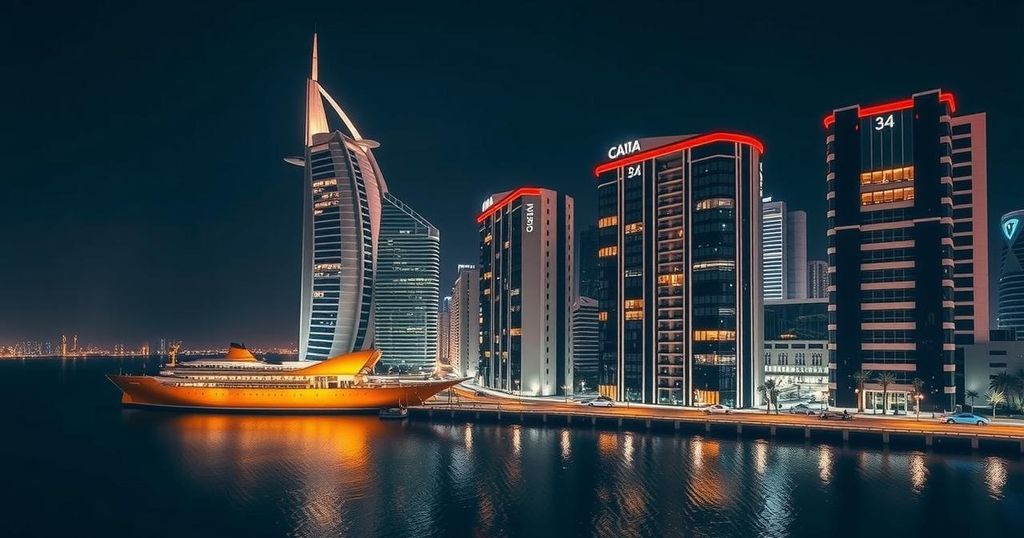Kazakhstan is witnessing a growing concern over the significant property holdings of former officials in Dubai, with over 1,550 Kazakh nationals registered as owners of more than 2,700 properties. The lack of transparency regarding the origins of these assets raises suspicions about potential misconduct. Despite government efforts to repatriate unlawfully obtained assets following civil unrest in January 2022, public access to asset declarations remains limited, challenging accountability measures. As the investigation continues, scrutiny is increasing around how these officials and their families acquired substantial wealth while in government service.
In Kazakhstan, there exists a notable concern regarding former and current officials who possess property in Dubai. Investigations have revealed a significant number of Kazakh citizens—specifically, 1,550—identified as property owners in Dubai, collectively holding over 2,700 properties valued at hundreds of millions of dollars. However, transparency around these holdings remains a contentious issue, as many officials and their families are reluctant to publicly declare such assets, raising questions about their origins. Kazakhstan ranks notably lower than the United Arab Emirates in terms of rule of law, which may contribute to the allure of investing in Dubai. While it is legitimate for high-net-worth individuals to seek investments abroad, the potential for illicit asset accumulation cannot be overlooked, especially in light of Kazakhstan’s government efforts to address capital flight since publicly denouncing the wealthy elite’s overseas holdings. The narrative took a turn following civil unrest in January 2022, prompting current President Qasym-Zhomart Toqaev to champion the repatriation of unlawfully obtained assets, implementing measures to curb capital outflow. However, public disclosure of asset declarations has been inadequate, leaving such information largely classified. Recent parliamentary discussions bring to light that Kazakh officials are collaborating with their UAE counterparts to investigate specific cases involving suspicious asset ownership. Yet, results of these investigations are not readily accessible to the public, rendering effective oversight difficult. Several of the individuals identified in Dubai property records have claimed that their purchases reflect business successes or earnings unrelated to their governmental positions, though skepticism persists within the public and media spheres over these assertions. Notably, some individuals, such as the family members of former president Nursultan Nazarbaev, appear repeatedly in property records, yet official scrutiny regarding their wealth remains minimal. Investigations prompt critical examination of how these officials and their families acquired significant property portfolios while serving in government roles often associated with comparatively modest salaries. Moreover, the phenomenon of registering properties under the names of relatives or associates poses additional challenges in tracing illicit wealth while the legal framework permits only limited engagement between the government and the media concerning declarations of assets owned abroad. In summary, the situation delineates a complicated nexus of wealth acquisition, the legal parameters surrounding disclosures, and broader implications for governance and integrity in Kazakhstan.
Kazakhstan is grappling with issues related to capital flight and officials’ unexplained wealth, particularly regarding substantial investments in Dubai real estate. Despite government initiatives aimed at repatriating capital and investigating the origins of wealth held by officials, transparency is limited, leading to public skepticism towards the elite’s financial dealings. The UAE, particularly Dubai, has gained attention as a potential safe haven for assets amidst allegations of tax avoidance and financial secrecy, which pose challenges for Kazakh authorities seeking to curb illicit financial activities. Following civil unrest in early 2022, the Kazakh government has intensified efforts to address this issue, albeit without significant results to report thus far.
The property holdings of former and current Kazakh officials in Dubai highlight critical questions about asset transparency and the integrity of wealth acquisition within Kazakhstan’s elite. Government measures to combat capital flight and promote the repatriation of illegally obtained assets are ongoing, but the challenges posed by secrecy in asset declarations, legal loopholes, and the reluctance of officials to disclose their holdings complicate the situation. Ultimately, the interplay of wealth, governance, and public trust remains a pressing issue as the government seeks to restore confidence and accountability in its economic institutions.
Original Source: www.rferl.org







